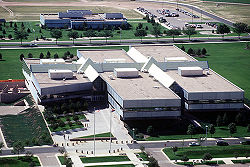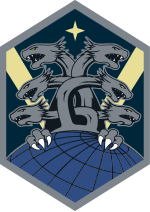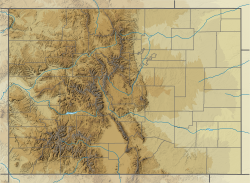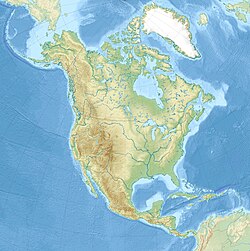Peterson Space Force Base, previously Peterson Air Force Base, Peterson Field, and Army Air Base, Colorado Springs, is a United States Space Force base that shares an airfield with the adjacent Colorado Springs Municipal Airport and is home to the North American Aerospace Defense Command (NORAD), the Space Force's 21st Space Wing, elements of the Space Force's Space Systems Command, and United States Northern Command (USNORTHCOM) headquarters. Developed as a World War II air support base for Camp Carson, the facility conducted Army Air Forces training and supported Cold War air defense centers at the nearby Ent Air Force Base, Chidlaw Building, and Cheyenne Mountain Complex. The base was the location of the Air Force Space Command headquarters from 1987 to 20 December 2019 and has had NORAD/NORTHCOM command center operations since the 2006 Cheyenne Mountain Realignment placed the nearby Cheyenne Mountain Complex on standby. On 26 July 2021, the installation was renamed Peterson Space Force Base to reflect its prominent role in the new space service.[2]
| Peterson Space Force Base | |||||||||||
|---|---|---|---|---|---|---|---|---|---|---|---|
| Colorado Springs, Colorado in United States | |||||||||||
 Peterson SFB's Hartinger Building which is the headquarters of Space Operations Command and United States Space Command. | |||||||||||
 Shield of Space Base Delta 1 | |||||||||||
| Coordinates | 38°49′25″N 104°41′42″W / 38.82361°N 104.69500°W | ||||||||||
| Type | U.S. Space Force base | ||||||||||
| Site information | |||||||||||
| Owner | Department of Defense | ||||||||||
| Operator | United States Space Force | ||||||||||
| Controlled by | Space Base Delta 1 | ||||||||||
| Condition | Operational | ||||||||||
| Website | www | ||||||||||
| Site history | |||||||||||
| Built | 1942 | ||||||||||
| In use | 1942 – present | ||||||||||
| Garrison information | |||||||||||
| Current commander | Col Zachary S. Warakomski | ||||||||||
| Past commanders | Col James E. Smith | ||||||||||
| Garrison | Space Base Delta 1 (Host) | ||||||||||
| Airfield information | |||||||||||
| Identifiers | IATA: COS, ICAO: KCOS, FAA LID: COS, WMO: 724660 | ||||||||||
| Elevation | 1,885.7 m (6,187 ft) AMSL | ||||||||||
| |||||||||||
| Airfield shared with Colorado Springs Airport Source: Federal Aviation Administration[1] | |||||||||||
History
editColorado military construction during the buildup of US training installations prior to the bombing of Pearl Harbor included the 1940 Lowry bombardier school at Denver and Camp Carson south of Colorado Springs (HQ completed on 31 January 1942). Sites "in the vicinity of Colorado Springs" were assessed in the summer of 1941 for a USAAF airfield,[3] and during April 1942 the Photographic Reconnaissance Operational Training Unit (PROTU) was activated in a leased facility[where?] at Colorado Springs.[4] On 6 May 1942, the site adjacent to the airfield of the 1926 Colorado Springs Municipal Airport was selected,[5] and the airport's airfield was subsequently leased as an "air support field"* for Camp Carson under the "air support base development program". In May 1942, units such as the 5th Mapping Squadron (from Bradley Field) arrived and used city facilities. The "Second Photographic Group Reconnaissance" (activated 7 May 1942 at Will Rogers Field)[6] transferred to Colorado Springs, and the "2nd Group ... headquarters was situated in a former garage across the street from the Post Office, barracks were in the city auditorium ... and the mess hall was located at the busy horseshoe counter of the Santa Fe railway station."[7] Land at the Broadmoor was used for maneuvers, and the 2nd Group initially operated without aircraft.[7] Personnel[specify] were also "housed temporarily at Colorado College" and a youth camp near the Woodmen sanitorium.[8] (the 14th Photographic Reconnaissance Squadron was located at the Kaufman Building on Tejon St.)[9]
Army Air Base, Colorado Springs
edit"Army Air Base, Colorado Springs",* construction began after 10 May 1942, on "nothing more than a large patch of Colorado plain",[10] and the installation was placed under the Headquarters, United States "AAF [on] 11 June 1942".[5] The 373d Base HQ and Air Base Sq was activated[where?] as the base operating unit on 20 June 1942 (replaced by the 214th AAF Base Unit in 1944), and the base was assigned to the 2nd Air Force on 22 June 1942. On 7 July 1942, "HQ PROTU" was on the "Army Air Base, Colorado Springs" and was ordered to provide "four to five months of training to each individual".[10] During air base construction, the 20th Combat Mapping Squadron was activated on 23 July 1942, and used the Alamo Garage[11] on Tejon Street.[12] Runways were completed in August 1942,[8] and eponym 1st Lt Edward J. Peterson crashed 8 August 1942 on take off (1st Coloradoan killed at the airfield.)
Peterson Field
editPeterson Field was the airfield named on 13 December 1942,[16] and included the runway used by both the municipal airport and the military installation:[17] "Army Air Base, Peterson Field", which had begun publishing the Wingspread base newspaper by 11 July 1942.[18] The "18 Dep Rpr Sq" was assigned to the military installation from 19 January – 29 April 1943, and the installation was assigned to the Third Air Force (5 March – 1 October 1943) and by the end of the 1943 summer had tar paper barracks, an officer's club, and a theater in a Quonset.[19] After the base transferred to Second Air Force on 1 October 1943,[5] in June 1944 Peterson Field began fighter pilot training[specify] with P-40N Warhawks.[16] "In March 1943 the Third Air Force took over the photographic reconnaissance Operational Training Unit which had been operating at Peterson Field ... under the direct control of the Director of Photography since April 1942".[20]
Bomber Commands
editThe 4th Heavy Bombardment Processing Headquarters ("4 H Bomb Processing HQ") was activated on 10 June 1943 (the 1st B-29 landed at Peterson Field in the summer of 1943),[19] and bomber training by the 214th AAF Base Unit (Combat Crew Training School, Heavy) B-24 Liberator)[failed verification] began after the 383rd Bombardment Group relocated from Geiger Field, Washington[16] on 26 October 1943. In 1944 (11 June – 20 October), the XXI Bomber Command was assigned to Peterson; and the "HQ and HQ Sq" of XXII Bomber Command was assigned 14 October 1944 – 13 February 1945, and by 17 August 1944, 4 bomb wings (313th through 316th) were assigned to the base — the last left on 7 June 1945.[5] The 263rd AAF Base Unit became the Peterson "base operating unit" on 8 March 1945 (transferred to Andrews Field on 17 March 1946).[5]: 8, 471 The Army Air Forces Instructor School[specify] opened at Peterson Field in April 1945,[16] and the base was one of several that transferred to Continental Air Forces on 16 April 1945. (VIII Bomber Command arrived 17 August 1945).
The base was inactivated 31 December 1945 after the 13th Bombardment Wing (17 October) and VIII Bomber Command (c. 15 December) departed, and site management by the base operating unit ended on 17 December 1945.[21] In 1946, Peterson's last AAF Base Units were discontinued: 260th AAF Base Unit (Fighter Wing) in January, the 202nd AAF Base Unit (Special) in February, and the 268th AAF Base Unit (Instrument Instructor Unit) in March and the 201st (Headquarters Base Unit) in April (the 72nd Fighter Wing was at the base from "4 January 1946 - 9 April 1946"). The 703rd AAF Base Unit (Hq, 53d AACS Group) moved to Kelly Field in February. Designated surplus on 29 July 1946,[5] "the U.S. Government returned control[specify] of the [air]field to the City of Colorado Springs".[22] Many of the base buildings were torn down.[22] In 1946, Tonopah AAF (Nevada, on 1 October), Clovis AAF (New Mexico, 16 October), and Casper AAF (Wyoming, on 15 December) became detached installations of the inactive base for a short period.
During planning for the new United States Air Force, Colorado's Arlington Auxiliary Army Airfield became a detached installation of the surplus base (1 January – c. 10 October 1947), and the "468th Construction Co (15th AF)" became the inactive base's operating unit in February 1947. The base with new construction was activated 29 September 1947 – 15 January 1948, then was "surplus"[5] until after the notice in November 1950 to reactivate Air Defense Command. The "23 Photo Sq 19 May 1943-9 August 1948" remained throughout both inactive/surplus periods, and the "4600 Maint & Sup Sq" was established at the surplus base on 1 December 1950).[5]
USAF installation
editThe military base at the municipal field reactivated as an off-base installation of Ent Air Force Base on 1 January 1951 and was operated by Ent's 4600 Air Base Group.[5] After being assigned to Peterson on 1 March 1952,[5] the 4602d Air Intelligence Service Squadron had subordinate organizations at the "Defense Force Headquarters [on] Hamilton Air Force Base, California, at Kansas City, Missouri,[specify] and at Stewart Air Force Base" New York.[23] The 4600th Group became the 4600th Air Base Wing on 8 April 1958 (moved to Peterson on 18 October 1972).[24]: 40 The 4600th was replaced by the 46th Aerospace Defense Wing on 1 April 1975.[24] In January 1968, Air Training Command's 3253d Pilot Training Squadron at Peterson Field began light aircraft indoctrination for cadets. These operations moved to the United States Air Force Academy on 21 March 1974.[25] The military base at Peterson Field gained its own base commander[specify] on 28 February 1975.
Primary installation
edit| External image | |
|---|---|
| Peterson.AF.mil gallery | |
| JFK's Air Force One at Peterson during 1963 Chidlaw Building/Cheyenne Mountain visit | |
| MAFFS aircraft at PAFB |
Designated Peterson Air Force Base on 1 March 1975, when Ent AFB was being closed, Peterson was the last of the April 1945 Continental Air Forces airbases to be named an air force base. Also on 1 March, Peterson assumed several functions from Ent AFB, which became the "Ent Annex" of Peterson, 18 July 1975 – 7 February 1978[5] (Peterson's off-base "Temporary Military Facility" was opened for space training by 1986). During the first part of the reorganization that broke up ADCOM,[24]: 46 the base "transferred to the Strategic Air Command" on 1 October 1979[22] (units transferred included the 47th Comm Sq to AFCS and the 46th Wing and 4602nd Computer Services Sq to SAC).[24]: 47 ADCOM HQ offices at the Chidlaw Building became the Aerospace Defense Center at Peterson on 1 December 1979.
Peterson's NORAD COC Backup Facility achieved Full Operational Capability on 16 November 1982[26] from the Cheyenne Mountain Complex which was placed on warm standby.
The 1st Space Wing replaced the 46th Aerospace Defense Wing on 1 April 1983. Thereafter the 1st Space Wing transferred host unit responsibility to the 3d Space Support Wing activated on 15 October 1986. Army and other units transferred from the former Ent AFB Federal Building to Peterson Building 2[citation needed] (renamed the Eberhart-Findley Building in October 2012).[26] On 15 May 1992, the personnel and equipment of both the 1st SW and 3d SSW merged to become the 21st Space Wing. Peterson's Space Analysis Center was at the corner of Academy & Fountain Blvds by 2004 before moving on base to bldg 1470, and in 2004 the Space Operations School used a building along I-25 at Woodmen Drive.
The Cheyenne Mountain Realignment moved NORAD/USNORTHCOM operations to Peterson AFB in 2006. In 2006, the 76th Space Control Facility was constructed at Peterson [27] (the squadron activated 22 January 2008). The MAFFS aircraft that fought the 2012 Waldo Canyon fire and 2013 Black Forest fire at Colorado Springs flew from Peterson AFB.
Some buildings from the Second World War have survived. Buildings remaining in 1996 were "the terminal, now the Peterson Air and Space Museum, the Broadmoor hangar, and the Spanish House" next to the museum,[28] along with Building 391, Building 365, supply warehouses and office buildings, and aircraft hangars and maintenance shops.[8]
The base's Retiree Activities Office has the representative for the Air Force Retiree Council Area IV (Colorado, Nevada, Utah, and Wyoming).[29]
On 20 December 2019, Air Force Space Command was redesignated as the U.S. Space Force and elevated to become an independent military branch.[30] With the new military branch, the Fourteenth Air Force and its units became Space Force Space Operations Command and Air Force Space Command's headquarters was redesignated as the Pentagon.
Based units
editFlying and notable non-flying units based at Peterson Space Force Base.[31][32][33][34][35][36]
Units marked GSU are Geographically Separate Units, which although based at Peterson, are subordinate to a parent unit based at another location.
United States Space Force (USSF)edit
Space Operations Command (SpOC)
Space Systems Command (SSC)
United States ArmyeditUS Army Space & Missile Defense Command / Army Forces Strategic Command (USASMDC / ARSTRAT)
Department of DefenseeditNorth American Aerospace Defense Command (NORAD)
United States Northern Command (USNORTHCOM)
|
United States Air Force (USAF)editAir Combat Command (ACC)
Air Mobility Command (AMC) Air Force Reserve Command (AFRC)
|
References
editDespite the number of vintage records with "Army Air Base, Colorado Springs", Mueller in 1989 (p. 471) claims the military installation next to the municipal airfield was initially named "Air Support Command Base" in May 1942, but does not identify an Air Support Command headquarters ever being at the air base, nor that base was even assigned to one of the support commands.
- ^ One or more of the preceding sentences incorporates text from this source, which is in the public domain: "Airport Diagram – Peterson AFB (KCOS)" (PDF). Federal Aviation Administration. 12 September 2019. Retrieved 16 September 2019.
- ^ One or more of the preceding sentences incorporates text from this source, which is in the public domain: Kerridge, Kasia (26 July 2021). "Peterson, Schriever and Cheyenne Mountain Air Force installations renamed to Space Force Monday". KKTV. Retrieved 26 July 2021.
- ^ Stratton, Major James H.; Cox, Lt L.E.; Harmon, Lt H.C. (August 1941). Report on Sites for Military Airfield in the Vicinity of Colorado Springs, Colorado (Report). available at USAFA Special Collections; Harmon, Harold C. Series One--Site Selection and Development; Box 1 Folder 1.
{{cite report}}: CS1 maint: location (link) - ^ One or more of the preceding sentences incorporates text from this source, which is in the public domain: Futrell, Robert F. (July 1947). Development of AAF Base Facilities in the United States: 1939–1945 (Report). Vol. ARS-69: US Air Force Historical Study No 69 (Copy No. 2). Air Historical Office.
- ^ a b c d e f g h i j k One or more of the preceding sentences incorporates text from this source, which is in the public domain: Mueller, Robert (1989). Air Force Bases (PDF) (Report). Vol. I: Active Air Force Bases Within the United States of America on 17 September 1982. Office of Air Force History. ISBN 0-912799-53-6. Archived (PDF) from the original on 16 August 2013.
Between 1 January 1951 and 28 February 1975 the base commander of Ent AFB also commanded Peterson Fld.
- ^ Organization History (First Installment): Second Photographic Group Reconnaissance (Report). Special Collections, USAF Academy Library (item 128.31:17).
From Activation 7 May 1942 to 31 December 1942
{{cite report}}: CS1 maint: location (link) - ^ a b Prinzo (Corporal, 2nd Grp payroll clerk) (c. 1945), [description of sites used by 2nd Photo Grp] (document with quotation)
{{citation}}: CS1 maint: numeric names: authors list (link) (quoted by First Installment) - ^ a b c One or more of the preceding sentences incorporates text from this source, which is in the public domain: Nash, Jeff (30 April 2012). "April 28 marks the 70th anniversary of the establishment of Peterson Air Force Base". AFSPC.af.mil. Archived from the original on 22 October 2013. Retrieved 9 October 2013. (republication of 2007 series of Space Observer articles) Archived 2013-10-17 at the Wayback Machine
- ^ Thole, David (24 August 2001). Flying Lightning: The History of the 14th Fighter Squadron (Google books). ISBN 9780595199686. Retrieved 9 October 2013.
- ^ a b HQ Memo to HQ PROTU, 7 July 1942 (quoted by First Installment)
- ^ St. John, Philip A. (1990). The Liberator Legend: The Plane and the People. ISBN 9780938021995. Retrieved 11 April 2013.
- ^ Colorado Springs Area Telephone Directory (phone book image), 1940, archived from the original on 20 July 2005
- ^ Army Air Forces Installations: 15 July 1944 (Map). (included at 7 unnumbered Futrell pages between pages 156 and 157) NOTE: The map shows the "COLORADO SPRINGS HQS 2AF" south-southwest of "PETERSON FLD", but perhaps is not-to-scale. The June 1944 AAF: The Official Guide to the Army Air Forces also identifies the "2nd Air Force" at "Colorado Springs" under "Brig. Gen. U. G. Ent", so perhaps the general was in command of the tent camp that later was named for him. Also, since Futrell p. 128 vaguely states the 2AF HQ was at a "leased facility", citing "Hist. 2d AF, 1943, v. 1, pp. 129–155", perhaps that source names the specific leased facility (e.g., city building at the tent camp.)
- ^ "Hist. 2d AF, 7 December 1941 to 31 December 1942, v. 2, p. 370; OCE, Hist. Branch, Mil. Constr. in the United States Under the Direction of the [illegible] and the C of E, v. 2, p. 258." (cited by Futrell Ch. IV, pp. 126 & 232)
- ^ Arnold, Henry H. (May 1944). AAF: The Official Guide to the Army Air Forces (June 1944--Special Edition for AAF Organizations ed.). New York: Pocket Books.
- ^ a b c d One or more of the preceding sentences incorporates text from this source, which is in the public domain: Nash, Jeff. "Peterson Air Force Base: From tiny air field to sprawling complex". Archived from the original on 5 November 2014. Retrieved 15 August 2013.
October 1943. The 383rd Bomb Group relocated here from Geiger Field, Washington, and formed a combat crew training school utilizing the B-24 "Liberator" heavy bomber.
- ^ This article incorporates public domain material from the Air Force Historical Research Agency[full citation needed]
- ^ "Wingspread". Colorado Springs, Colo. : Milo W. Williams. 4 May 2018. Retrieved 4 May 2018 – via Trove.
- ^ a b Didion, Joan (14 August 1965). "John Wayne: A love song". Saturday Evening Post: 76–79.
In the summer of 1943 ... at Peterson Field [there were] tar-paper barracks and the temporary [air]strip and ... they brought in the first B-29. ... There was an Officer's Club, but no swimming pool; all the club had of interest was artificial blue rain behind the bar ... sat on folding chairs in the darkened Quonset Hut which served as a theater
- ^ Quotation by Futrell Ch. IV, p. 131, which cites the source(s) on p. 234: Hist. 3d AF, Flying Training 1941 to 1944, v. 1, p. [tbd]; Narrative Hist. Rpt., Peterson Fld., 29 April 1942 to 1 October 1943, v. 2, pp. 2–4, in AFSHO 287.50-1, v. 2.
- ^ Mueller p. 471 claims Peterson's base operating unit was the 263rd AAF BU from 8 Mar 1945 – 17 December 1946 — during the inactive and surplus period, but Mueller p. 8 claims the 263rd AAF BU was at Andrews AFB from 17 March 1946 until 23 February 1948. Perhaps "263" is a Mueller typo that should be "268", which is the number of the base operating unit for the preceding period and that Mueller claims continued until 10 March 1946?
- ^ a b c One or more of the preceding sentences incorporates text from this source, which is in the public domain: Toro, MSgt. Radames; Barrios, MSgt. Ramon A. (1 August 1993). "Chapter 1: Command Overview". Space Operations Orientation Course (Third ed.). Peterson AFB, Colorado: 21st Crew Training Squadron.
At the end of the war in 1945, the U.S. Government returned control of the [Peterson] field to the City of Colorado Springs and many of the military buildings were torn down. In 1948 ... the 15th Air Force, then headquartered at Ent AFB ... One year later, the 15th Air Force relocated to March AFB California, and ... the Air Force portion of Peterson Field were placed on inactive status. ... Operational control at this time was provided by the 4600 Air Base Group ... On 1 October 1979, control of [Peterson AFB] was transferred to the Strategic Air Command. ... During December 1987, 2500 USSPACECOM and AFSPACECOM personnel relocated to their new Headquarters on Peterson AFB from the Chidlaw Building in Colorado Springs ...
(p. 3) - ^ "4602d AISS Unit History Sampler" (transcribed excerpts of Secret History of 4602D Air Intelligence Squadron). Cufon.org. Archived from the original on 4 October 2013. Retrieved 9 October 2013.
- ^ a b c d One or more of the preceding sentences incorporates text from this source, which is in the public domain: compiled by Johnson, Mildred W. (31 December 1980) [Feb 1973 original by Cornett, Lloyd H. Jr]. A Handbook of Aerospace Defense Organization 1946–1980 (PDF). Peterson AFB: Office of History, Aerospace Defense Center. pp. 18, 40. Archived (PDF) from the original on 23 November 2006. Retrieved 26 March 2012.
- ^ A Brief History of Keesler AFB and the 81st Training Wing (PDF) (Report). Vol. A-090203-089. pp. 173, 198. Archived from the original (PDF) on 4 September 2012. Retrieved 8 July 2013.
- ^ a b One or more of the preceding sentences incorporates text from this source, which is in the public domain: "Archived copy" (PDF). Archived from the original (PDF) on 20 April 2015. Retrieved 21 September 2012.
{{cite web}}: CS1 maint: archived copy as title (link) - ^ "Archived copy" (PDF). Archived from the original (PDF) on 15 September 2012. Retrieved 12 May 2013.
{{cite web}}: CS1 maint: archived copy as title (link) - ^ One or more of the preceding sentences incorporates text from this source, which is in the public domain: Gates, SSgt Andrew (September 1996). "Medal of Honor grove highlights Air Force heroes". Guardian. Peterson AFB: 21st Space Wing public affairs: 16–17.
Medal of Honor grove, an anchor point for the base's historic district
- ^ One or more of the preceding sentences incorporates text from this source, which is in the public domain: Peterson Air Force Base - 21st Space Wing Retiree Activities Office Archived 2013-06-09 at the Wayback Machine Peterson.af.mil (2004-10-01) Retrieved on 2013-09-18
- ^ One or more of the preceding sentences incorporates text from this source, which is in the public domain: "Fact Sheet". spaceforce.mil.
- ^ One or more of the preceding sentences incorporates text from this source, which is in the public domain: "Peterson Units". Peterson AFB. US Space Force. Retrieved 31 July 2020.
- ^ One or more of the preceding sentences incorporates text from this source, which is in the public domain: "Units of the 21st Space Wing". Peterson AFB. US Air Force. Retrieved 23 September 2019.
- ^ One or more of the preceding sentences incorporates text from this source, which is in the public domain: "Peterson AFB – Mission Partners". MyBaseGuide. 8 October 2018. Retrieved 23 September 2019.
- ^ One or more of the preceding sentences incorporates text from this source, which is in the public domain: "Units". 302nd Airlift Wing. US Air Force. Retrieved 23 September 2019.
- ^ One or more of the preceding sentences incorporates text from this source, which is in the public domain: "561st Network Operations Squadron". Air Forces Cyber. US Air Force. July 2018. Retrieved 23 September 2019.
- ^ One or more of the preceding sentences incorporates text from this source, which is in the public domain: "70th ISR Wing". 25th Air Force. US Air Force. 19 February 2019. Retrieved 23 September 2019.


